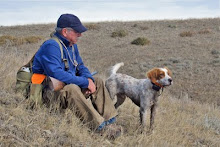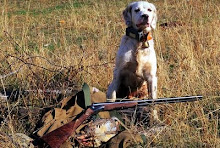Elongated
soft palate (ESP) is one of a set of conditions normally associated
with brachycephalic syndrome, which is endemic to pug-nosed dogs.
These breeds very often suffer breathing and other problems due to
the truncation of their noses. What
I did not know is that pointing breeds can suffer from the problem.
For
a bird dog ESP is a huge problem - the rear of the soft palate
extends down far enough to partially block the airway leading to the
trachea and it makes full inhalation and exhalation especially
difficult. Animals with elongated soft palates breathe heavily with a
fluttering , gasping sound. They may also gag when they try to
swallow, and may even have pale gum tissue from lack of oxygen in the
blood after exercise.
My
young pup, Little John or "LJ", has been with John McIltrot
in Montana since last summer. John noticed that he ran well but tired
much sooner than he should. John spoke with Dr. Terry Terlep, DVM of
Thomasville, Georgia who felt that the symptoms were consistent with
ESP. Subsequent medical examination revealed that his airway was
restricted due to an elongated soft palate. "It was like he was
trying to run a marathon while breathing through a soda straw"
according to John. He just could not show us what we truly expected
from him.
This
is the first I have heard of this problem in pointing dogs. I spoke
with Dr. Terlep hoping to learn more about ESP in pointing dogs. He
told me that when he had his practice in South Florida he would see
four or five bird dogs a year that were afflicted with ESP. "Owners
usually came in saying the dog overheated or lacked stamina. The
sound of dogs with elongated soft palate is distinctive, the dog
breathes like a freight train after exercise and the labored
breathing has a fluttering sound."
"The
treatment for elongated soft palate is surgical, simple and
effective. The operation takes only 30 minutes or so and when
completed the difference in performance is dramatic. This problem can
be present in all pointing breeds and is hereditary, but the genetics
have not really been studied " Dr. Terlep continued. I think
bird dog people, especially breeders, need to take this more
seriously. Certainly they should learn to recognize the symptoms and
seek treatment when they see it."
On
January 4th, Dr. Rich Scherr, DVM, of Great Falls operated and
corrected LJ's palate. It is a relatively simple procedure that
employs a laser to cut away excess soft palate tissue and
simultaneously cauterize the wound. Dr. Scherr also mentioned that LJ
had robust aerobic capability comparable to the 'plumbing' of a
larger dog. We are hoping that this correction helps LJ to reach his
full potential.
Here is LJ - sedated and ready for the procedure that will allow him to better do what he was bred to do.









2 comments:
First I had heard about this, how is he doing now?
He is like a new dog, Pete! great endurance and his bird finding has gone to the next level. Doing well.
Post a Comment